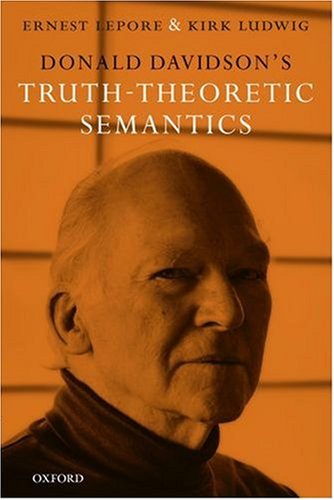

Most ebook files are in PDF format, so you can easily read them using various software such as Foxit Reader or directly on the Google Chrome browser.
Some ebook files are released by publishers in other formats such as .awz, .mobi, .epub, .fb2, etc. You may need to install specific software to read these formats on mobile/PC, such as Calibre.
Please read the tutorial at this link: https://ebookbell.com/faq
We offer FREE conversion to the popular formats you request; however, this may take some time. Therefore, right after payment, please email us, and we will try to provide the service as quickly as possible.
For some exceptional file formats or broken links (if any), please refrain from opening any disputes. Instead, email us first, and we will try to assist within a maximum of 6 hours.
EbookBell Team

4.1
100 reviews
ISBN 10: 0199290938
ISBN 13: 9780199290932
Author: Ernest Lepore, Kirk Ludwig
Ernest Lepore and Kirk Ludwig examine the foundations and applications of Davidson's influential program of truth-theoretic semantics for natural languages. The program uses an axiomatic truth theory for a language, which meets certain constraints, to serve the goals of a compositional meaning theory. Lepore and Ludwig explain and clarify the motivations for the approach, and then consider how to apply the framework to a range of important natural language constructions, including quantifiers, proper names, indexicals, simple and complex demonstratives, quotation, adjectives and adverbs, the simple and perfect tenses, temporal adverbials and temporal quantifiers, tense in sentential complement clauses, attitude and indirect discourse reports, and the problem of interrogative and imperative sentences. They not only discuss Davidson's own contributions to these subjects but consider criticisms, developments, and alternatives as well. They conclude with a discussion of logical form in natural language in light of the approach, the role of the concept of truth in the program, and Davidson's view of it. Anyone working on meaning will find this book invaluable.
1 Truth-Theoretic Semantics: Basic Framework
1 The Compositionality Requirement
2 Problems for Meanings
3 Convention T and the Proposal to Use a Truth Theory as a Vehicle for a Meaning Theory
4 A SampleTheory
5 Interpretive Axioms and Canonical Proofs
6 Context Sensitivity
7 Davidson’s Convention T
8 Adapting the Truth Theory
9 A Formulation of an Explicit Meaning Theory
10 A Brief Review of Some Objections
11 Summary
2 Quantifiers
1 Unrestricted Quantifiers
2 Truth and Satisfaction
3 Restricted Quantifiers
Appendix A. Quantification without Satisfaction
Appendix B. An Alternative Formulation of the Satisfaction Clauses
3 Implementation of the Extension of the Truth Theory to Quantifiers
1 Additions to the Syntax of Simple English[sub(1)]
2 A Truth Theory for Simple English[sub(2)]
3 Proofs of T-Sentences
4 Convention T Revisited
5 Regimentation and Natural Language
Appendix A. Rules Used in Proofs
Appendix B. A Canonical Proof Procedure
4 Proper Names, Indexicals, and Simple Demonstratives
1 Proper Names
2 Numerals, Complex Date Names, Function Terms
3 Complex Referring Noun Phrases
4 Indexicals
5 Simple Demonstratives
6 Multiple Demonstratives
5 Complex Demonstratives
1 Evidence that Complex Demonstratives are Quantified Noun Phrases
2 Demonstratives as Quantifiers
3 Semantics for Complex Demonstratives
4 Pragmatics of Complex Demonstratives
5 An Objection and Rejoinder
6 Specialized Demonstratives
6 The Semantics of Quotation
1 Traditional Treatments of Quotation
2 Davidson’s Proposal
3 Evaluation
4 A Simple Alternative Reference Rule
7 Adjectives and Adverbs
1 Adjectival Modification
2 Adverbial Modification
3 Thematic Roles
4 Doing Things Together
5 Topic Dependent Adverbs
8 The Simple Tenses of State and Event Verbs
1 The Simple Tenses of State Verbs
2 Simple Tenses and Event Verbs
3 The Progressive
9 Temporal Adverbials and Quantifiers
1 Temporal Adverbs and Adverbials
2 ‘Before’ and ‘After’
3 Temporal Quantifiers
4 Habitual Sentences and Frequency Adverbials
5 Relation to the Event Analysis
10 Tense in Sentential Complements and the Perfect Tenses
1 Thought and Tense
2 Adverbial Modifiers in Complement Clauses
3 The Perfect Tenses
4 Comparison with Reichenbach’s Account
11 Opaque Contexts: Indirect Discourse and Attitude Sentences
1 Davidson’s Account of Indirect Discourse
2 Objections
3 Responses
4 Conclusion
12 Non-Declarative Sentences
1 Davidson’s Paratactic Account of Mood
2 Difficulties for the Paratactic Account of Mood
3 The Fulfillment-Conditional Approach
4 Extension to Open Sentences
13 Semantic Structure and Logical Form
1 What is Logical Form?
2 Logical Form from the Perspective of Truth-Theoretic Semantics
3 Relation to Canonical Representations
4 Relation to Logical Constants
5 Logical Consequence and Structural Consequence
6 Extension to Imperatives and Interrogatives
Appendix
14 Truth and Correspondence
1 The Coherence Theory of Truth
2 The Redundancy Theory of Truth
3 The Correspondence Theory of Truth
4 Tarski and Correspondence
donald davidson theory of meaning
donald davidson pdf
donald davidson on the very idea of a conceptual scheme
davidsonian semantics
donald davidson theory of truth
donald davidson truth
donald davidson truth and meaning summary
Tags: Ernest Lepore, Kirk Ludwig, Davidson, Theoretic